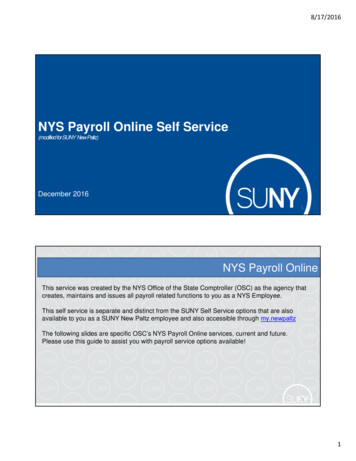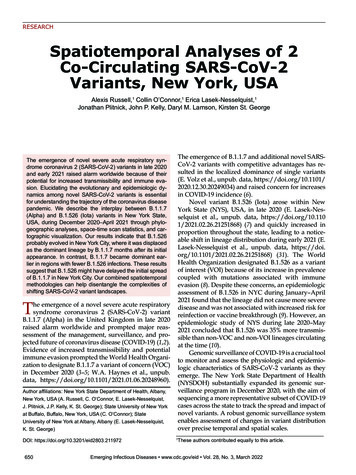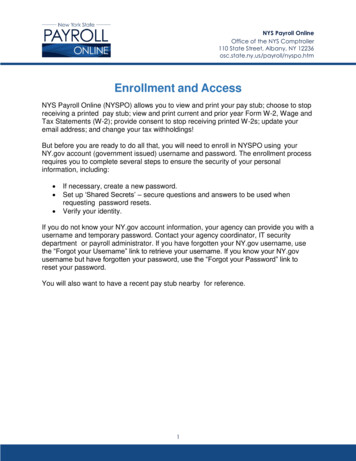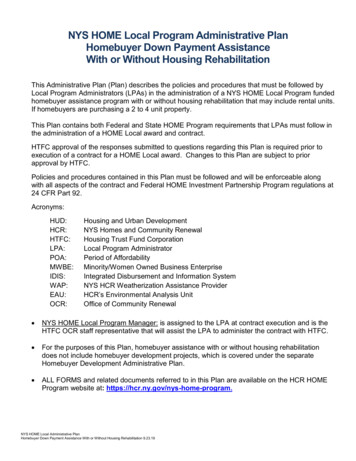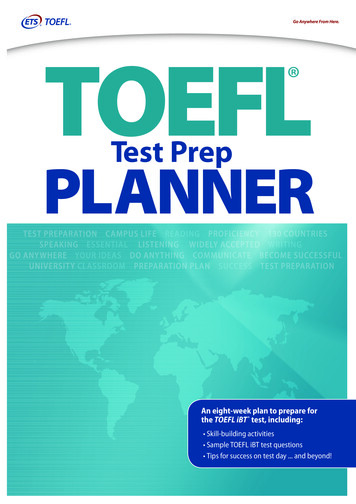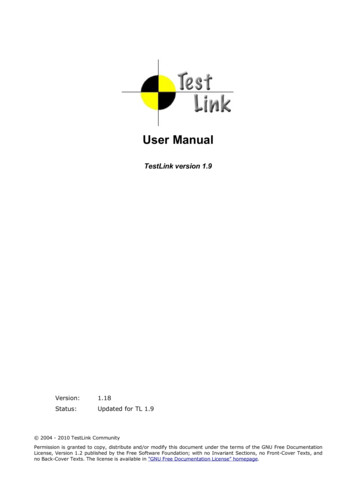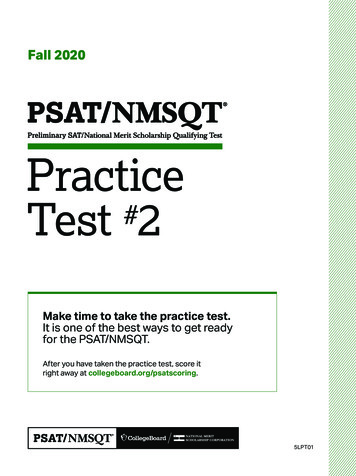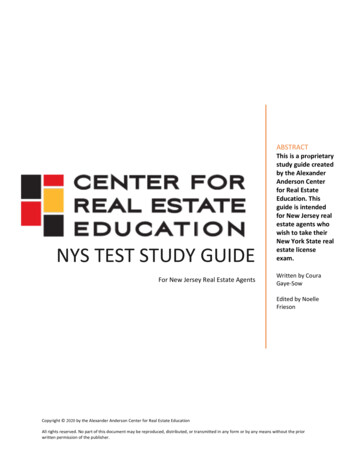
Transcription
ABSTRACTNYS TEST STUDY GUIDEFor New Jersey Real Estate AgentsThis is a proprietarystudy guide createdby the AlexanderAnderson Centerfor Real EstateEducation. Thisguide is intendedfor New Jersey realestate agents whowish to take theirNew York State realestate licenseexam.Written by CouraGaye-SowEdited by NoelleFriesonCopyright 2020 by the Alexander Anderson Center for Real Estate EducationAll rights reserved. No part of this document may be reproduced, distributed, or transmitted in any form or by any means without the priorwritten permission of the publisher.
First, Congratulations! You are taking the first steps towards becoming a dual licensed agent in both NewJersey and New York states. To take your New York State exam you must mail in the necessary forms for yourNew York Real Estate Education Waiver along with your certificate of completion from your original real estateschool. The NY forms are located in the back of this book. Please read all of the requirements and directionsprovided by New York State before sending in the forms. Upon successful completion of the NY required stepsyou will receive an education waiver which will allow you to take the NY State exam.Please note, you must be a licensed NJ real estate agent before you can request the education waiver for NewYork State.This packet contains the following: A study packet for the NYS State Test. We here at the Center for Real Estate Education have compiledout the information from the NYS text book that is NYS specific. This is information that may differ fromthe State of New Jersey or may not be emphasized as much in the New Jersey textbook. Please notethat we have tried to be as extensive as possible, however, the only way to get ALL of the informationtaught in the NYS course is to read the NYS text book. The New York State licensing application and instructions.Instructions to Obtaining Your NY Sales Person License.To obtain the NYS Education Waiver for the 75 Hour Licensing Course, you must1.Submit a written request stating the waiver you are applying for.2.A detailed outline listing topics and hours, and a course description.3.Original proof of course completion:a.4.If you are not a graduate from the Center for Real Estate Education, you must contact youroriginal 75 Hour Course school to obtain an extra certificate.Send a completed NYS application for Sales Persons and fees to the Department of Licensing Services.Please see the application and instructions in this packet.If you have any questions, feel free to email, The Center for Real Estate Education, at info@recareercenter.com.
Table of Contents1. LICENSING LAW & REGULATIONS2. THE LAW OF AGENCY3. AGENCY RELATIONSHIPS AND DISCLOSURE4. ESTATES AND INTERESTS5. LIENS AND EASEMENTS6. REAL ESTATE INSTRUMENTS: DEEDS7. REAL ESTATE INSTRUMENTS: LEASES8. REAL ESTATE INSTRUMENTS - CONTRACTS9. TITLE AND CLOSING COSTS10. MORTGAGES11. REAL ESTATE FINANCE12. MORTGAGE BROKERAGE13. LAND USE AND REGULATIONS14. MUNICIPAL AGENCIES15. INTRODUCTION TO CONSTRUCTION16. VALUATION PROCESS17. HUMAN RIGHTS AND FAIR HOUSING18. ENVIRONMENTAL ISSUES19. INDEPENDENT CONTRACTOR / EMPLOYEE20. INCOME TAX ISSUES IN REAL ESTATE TRANSACTIONS21. COMMERCIAL AND INVESTMENT PROPERTIES22. PROPERTY MANAGEMENT23. TAXES AND ASSESSMENTS24. CONDOMINIUMS AND COOPERATIVES25. PROPERTY INSURANCE26. NYS LICENSING FORMS
New York State Test Study GuideLICENSING LAW & REGULATIONSNew York License Law:Through real estate brokerage, New York License Law protects and prevents economic loss for thegeneral public while maintaining high standards.The Department of State (DOS) establishes the laws that govern the real estate profession andimplement the rules and regulations of those laws. (http://www.dos.ny.gov/licensing/index.html)The salesperson or associate broker transacts business in the name of the broker in conjunction with all.Article 12-A relates to the licensing of real estate services. Any violation is considered to be at minimuma misdemeanor.Violations are punishable by a fine of up to 10,000, up to 1 year in jail, in case ofadministrative discipline, the licensee may be fined or reprimanded, or their licensesuspended or revoked. The most common violations are a substantial misrepresentation,failure to account or remit monies belonging to others, failure to appropriate propertydefect disclosure, obtaining a license fraudulently, interfering with the agencyrelationship of another, discrimination, and interruption of essential building service byreal estate brokers providing tenant relocation services.Licensees are entitled to a hearing with DOS and can be represented by legal counsel.License Exemptions May Be Provided For: Attorneys licensed to practice in New York, they do not have to take the licensing examinationbut must request a broker’s license from DOS and pay the required feesPublic officials performing official public dutiesUnder a court orderResident managersTenant organizations and not-profit-organizationsCopyright 2020 by the Alexander Anderson Center for Real Estate EducationAll rights reserved. No part of this document may be reproduced, distributed, or transmitted in any form or by any means without the priorwritten permission of the publisher.1
New York State Test Study GuideLicensure Basic Requirements:Salesperson: 18 years oldHonest and trustworthyNever have been convicted of a felony or sexual offenseLegal right to work in the USA75 hours of pre-licensing coursePass the state examHave a sponsoring licensed brokerPay a 50 license fee (A pocket card will be issued to the licensee.)Broker: 20 years old45 hours of broker courseFor broker associates - Have a sponsoring brokerTwo years of experience and 3,500 points or three years of equivalent experience and 5,250pointsPay a 150 license feeThe broker keeps the licenses of salespersons and associate brokersChanges In Business:DOS must be notified online within five days of a change of name or place of business. The fees are 10per license and 150 for a new license.Termination: The broker must return the license to the licensee and file a termination of associationwith DOS. Between sponsors, the licensee cannot perform any work. The new broker must notify DOSand pay a 20 fee.Commissions: The sponsoring broker for associated salespersons or brokers only pay commissions.A kickback refers to a situation in which a real estate agent improperly shares or receives moneyfrom a company for referral services.A rebate can be given to seller, buyer, landlord, or tenant as a business incentive and under theauthority of the sponsoring broker.Interest in a property listed by a licensee for their own account is acceptable only if the licenseemakes their position known to the owners involved.Copyright 2020 by the Alexander Anderson Center for Real Estate EducationAll rights reserved. No part of this document may be reproduced, distributed, or transmitted in any form or by any means without the priorwritten permission of the publisher.2
New York State Test Study GuideAdvertising Rules: Name of the broker’s firm must clearly indicate it is a real estate broker, full address or phonenumber must be included, and salesperson name may not be displayed more prominently thanthe broker’s or firm name.The consent of the owner must be obtained before putting a real estate sign on the property.Continuing Education:Requirements are 22.5 hours of approved continuing education with at least 3 hours that cover FairHousing and 1 hour of Agency. Failure to complete the CE requirements may require a licensee torequalify for a license. Extensions are rarely approved.Exemptions are granted to NY attorneys and brokers who are licensed for at least 15 consecutive years.Failure to renew will terminate permanently the exemption.A licensee who does not renew within 2 years of expiration must retake the licensing examination.General Rules for Operating a Brokerage Business in NY:The place of business must be in New York.Signs must be readily identifiable and principal broker’s name printed on it.The branch office must be under the supervision of the broker to whom the license to operate a branchoffice was issued. An associate broker may operate a branch office as an office manager under theprincipal broker's supervision. Each branch must have an original separate license and pay a 150 fee.Documents related to a real estate transaction must be kept on file for at least 3 years.The broker must maintain a separate escrow account and avoid interest-bearing accounts unless withthe written agreement of the parties who will receive the interest.An unlicensed real estate assistant may engage in administrative activities only. They may NOT list, sell,hold open houses alone, or answer buyers’ questions.Property Condition Disclosure is required to be completed and signed by every seller. Delivery of thedisclosure document must occur before the buyer signs a binding contract of sale. Once signed by the seller and the buyer a copy must be attached to the real estate contract.Failure to provide entitles the buyer to a 500 credit against the purchase price.Uncapped natural well gas, if know by the seller, has to be disclosed before entering into acontract.Copyright 2020 by the Alexander Anderson Center for Real Estate EducationAll rights reserved. No part of this document may be reproduced, distributed, or transmitted in any form or by any means without the priorwritten permission of the publisher.3
New York State Test Study GuideTHE LAW OF AGENCYThe Law of Agency governs the business activity of a Brokerage.An agency is a relationship based on trust and confidence between an agent and a principal or client. Anagency relationship may also be called a fiduciary relationship. It is defined in Article 12-A.The agency relationship can be expressed by oral or written agency agreement or implied from actionsof the parties.It can be created after the fact, by ratification, when one party continues to accept what was bargainedfor, after the parties realize that a mistake or misrepresentation occurred, or by estoppel when there isno express agreement, and someone claims to be an agent.The broker is the agent of the client and sponsored licensees are a subagent of the client.A cooperating broker that represents a buyer is not a subagent of the seller.A client or principal working with an agent is entitled to CCLOAD.A customer working with an agent is entitled to reasonable skill and care, and disclosure of materialfacts and accounting of all monies.Dual agency is legal in New York with full disclosure and informed consent of all parties in writing.If the agent offers real estate advice and counsel to someone other than the client, it can create animplied agency and possibly an undisclosed and unconsented dual agency that could be a breach offiduciary duty to the original client.Self-dealing occurs when a broker lists a property and then decides to buy it and collect the agreedcommission. It may create an undisclosed dual agency and is forbidden by NY laws without informingthe seller or the purchaser of their interest.Major Categories of Agency RelationshipA Universal Agent has a wide range of authority delegated by the client. NYS law requires a signed andnotarized power of attorney.A General Agent handles tasks under detailed instructions; a power of attorney may be involved.A Special Agent is the most restrictive form of agency with a specific task on behalf of the client underdetailed instructions.Copyright 2020 by the Alexander Anderson Center for Real Estate EducationAll rights reserved. No part of this document may be reproduced, distributed, or transmitted in any form or by any means without the priorwritten permission of the publisher.4
New York State Test Study GuideAn Agent with Interest has some interest or ownership in the transaction. He/she cannot be fired, norcan the relationship be terminated.The source of compensation does not determine agency.More than one party to a transaction can compensate a broker with the informed consent of all parties.Listing AgreementsNY statute of frauds requires that listing agreements with duration of 1 year or more be in writing to beenforceable.Exclusive listings for a 1 to 3 family home have to attach the paragraphs defining the terms of exclusiveright to sell or exclusive agency. They have to be in writing regardless of the duration.All offers must be presented to the seller as soon as possible up to until the time the transaction closes.Commissions:Commissions are always negotiable and are typically an agreed upon percentage but can be a set feeand a sliding scale. Any agreement for commission should be in writing and signed by all parties.The broker must be actively licensed, be the procuring cause, produce a ready willing and able buyer,and bring about a meeting of the minds.Misrepresentation:Misrepresentation is the most common complaint against licensees.The agent gives wrong information in the listing, or when asked, states an opinion as a fact. Please note:Not clearly stating that an opinion is an opinion, even without intent to deceive, is itself amisrepresentation.Puffing is an obvious exaggeration of the benefits of a property and is not illegal.Actual or active fraud is an intentional misstatement or concealment of a material defect.Constructive fraud is when the misstatement or concealment was unintentional, but the result isnegligence or incompetence.Copyright 2020 by the Alexander Anderson Center for Real Estate EducationAll rights reserved. No part of this document may be reproduced, distributed, or transmitted in any form or by any means without the priorwritten permission of the publisher.5
New York State Test Study GuideAntitrust Laws:The Sherman Antitrust Act was passed in 1890 and enhanced in 1914 by the Clayton Act . This was thesame year the Federal Trade Commission (FTC) was created.Antitrust laws prohibit price fixing, group boycotting, market allocation, and tie-in arrangements (realand personal properties must be bought together).Antitrust violations are felonies and penalties include fines and even imprisonment.Copyright 2020 by the Alexander Anderson Center for Real Estate EducationAll rights reserved. No part of this document may be reproduced, distributed, or transmitted in any form or by any means without the priorwritten permission of the publisher.6
New York State Test Study GuideAGENCY RELATIONSHIPS AND DISCLOSUREA precisely worded agency disclosure must be provided at the first substantive contact. Clients andcustomers should sign it, if not the agent must complete it and keep an affidavit.It applies to all residential transactions (sale or lease within a building containing four or fewer dwellingunits).It does not apply to commercial transactions, but the law of agency does.Anytime an agency relationship changes, a new form must be presented and signed.The NYS Agency Disclosure Form does not create an agency relationship. Dual agency is permissible onlywith written consent of the parties. In-house sales are a risky type of accidental or implied dual agency.Undisclosed dual agency can result in loss of license, disciplinary actions, and loss of commission.Designated agency occurs when a broker designates two different salespersons to separately representeach party in a transaction.A broker-agent is an agent of the listing broker but not a subagent of the seller. Broker-agents havefiduciary duties to the seller, but the seller is not liable for the acts of the broker-agent. This is intendedto eliminate a seller’s vicarious liability.A seller does not have to offer sub agency to MLS members but can still gain exposure through the MLS.The seller, buyer, or both may compensate a buyer’s agent.The broker must retain all signed forms and affidavits for 3 years.NYS DOS requires that every listing contract contain an explanation of the difference between anexclusive right to sell and an exclusive agency.New York statute of fraud requires that listing agreements of one year or more be in writing to beenforceable.Net listings are illegal in New York.Copyright 2020 by the Alexander Anderson Center for Real Estate EducationAll rights reserved. No part of this document may be reproduced, distributed, or transmitted in any form or by any means without the priorwritten permission of the publisher.7
New York State Test Study GuideDisclosures Required: Property Condition Disclosure. By the seller. If the disclosure is not available, a 500 credit isdue to the buyer at closing against the purchase price.Lead Paint Disclosure. Tenants and buyers are offered an opportunity to test for lead paint andto withdraw from the transaction if it is found. Failure to comply carries an 11,000 penalty foreach violation.A Lead Paint Disclosure is required for any property built before 1978. Buyers must be allowed10 days in which to investigate potential lead-based paint hazards before the contract becomesbinding.Truth-in-Heating Disclosure. NYS requires that sellers of one or two family dwellings makeavailable two-year history of heating and air conditioning bills.Sprinkler-System Disclosure. NYS requires the landlord to disclose whether or not the rentalproperty has sprinklers.Bedbug Disclosure Law. New York City (NYC) requires landlord or property managers to providea one-year history of any bed-bug infestation.Window Guard Disclosure. New York City requires the tenant to disclose any children under 11.The landlord must provide the installation of window guards.*If a property was the scene of a suicide or violent crime, there are paranormal activities, or sexoffenders in the vicinity; the licensee need not disclose unless the sellers chose to do so.Any unsigned listing is equivalent to an open listing.An exclusive agency or exclusive right to sell must be in writing and signed by the principal.A verbal exclusive listing is not binding, and the principal may or may not honor it.Copyright 2020 by the Alexander Anderson Center for Real Estate EducationAll rights reserved. No part of this document may be reproduced, distributed, or transmitted in any form or by any means without the priorwritten permission of the publisher.8
New York State Test Study GuideESTATES AND INTERESTSLand:“Land” includes the surface, under the surface, and the air space above it. Ownership may be held bydeed, by one or several different owners.“Real Estate” includes the land and man-made improvements attached to it.“Real Property” includes real estate and the bundle of legal rights.Personal property or chattels become a fixture when it is permanently attached to the land and can beincluded in the real estate.The basic economic characteristics of the land influence its value: ScarcityImprovementsPermanenceAn area of preferenceThe physical characteristics of the land are: :An estate is a kind of ownership interest someone holds.Freehold estates may be held indefinitely: fee simple, life estate, fee on condition, and fee qualified.Leasehold estates have a definite length: rental tenancy.New York is not a community property state and does not recognize dower and curtesy.Homestead is not an estate in New York.Copyright 2020 by the Alexander Anderson Center for Real Estate EducationAll rights reserved. No part of this document may be reproduced, distributed, or transmitted in any form or by any means without the priorwritten permission of the publisher.9
New York State Test Study GuideThe tenancies recognized in New York are: SeveraltyIn commonBy the entiretyJointA title is held in trust when the trustor (original owner) conveys the title of the property to a trustee toadminister the property on behalf of a beneficiary.A business may own real estate through a limited liability company, a corporation, a syndicate, or ajoint venture.A cooperative creates house rules with their bylaws and individual owners hold shares of a proprietarylease.A condominium owner has a fee simple title, pays common charges, and is responsible for its own realestate taxes.A condop is a building with residential units owned as co-op and commercial units owned by thesponsor as condominium units.Bodies of Water: Bodies of water are owned in a different way.Riparian rights refer to non-navigable water. The waterway is owned to the center.Littoral rights refer to large bodies of water. The landowner owns the land up to the high-watermark.Copyright 2020 by the Alexander Anderson Center for Real Estate EducationAll rights reserved. No part of this document may be reproduced, distributed, or transmitted in any form or by any means without the priorwritten permission of the publisher.10
New York State Test Study GuideLIENS AND EASEMENTSLiens:A lien is a financial claim against a debtor. Specific liens cover one parcel of real estate while generalliens cover real and personal property.Real estate taxes are always the first lien.The priority of liens is established in the order they are recorded. This priority can change subject to asubordination agreement between lienholders.The different types of liens are: Mechanic liensReal estate tax lien that become a lien on the property in NYC on July 1st of each yearJudgmentsLis PendensFederal estate taxesState inheritance taxesA vendor lien is a claim by a seller against a buyer who failed to pay the entire purchase price.A vendee lien is a claim by a buyer in the context of an installment contract, and the seller failed toconvey title.Easements:An Easement by Grant happens when a property owner retains the right of ownership to the property.It may include clauses such as limited liability, limited access restoration rights, and revisionary rights ofthe property owner. These rights will not interfere with the easement holder’s rights to use the propertybut will protect the owner’s rights.An easement by prescription in New York gives permanent rights to use another’s property after 10years.A party wall easement is shared by two buildings and constructed in the boundary line between twoowner’s lots.Copyright 2020 by the Alexander Anderson Center for Real Estate EducationAll rights reserved. No part of this document may be reproduced, distributed, or transmitted in any form or by any means without the priorwritten permission of the publisher.11
New York State Test Study GuideREAL ESTATE INSTRUMENTS: DEEDSA metes-and-bounds description uses the physical location of monuments to describe an enclosed tract.They always end back at the point of beginning.The government survey was established by congress and is seldom used in New York and the otheroriginal 12 states.Recorded plats are filed in the recorder’s office of the county.The block and lot is considered the legal description and is assigned by the tax assessor. They arecertified by a survey.Latches are a type of statute of limitation (6 years) on a person’s right to enforce their rights in acontract. After 6 years the rights are forfeited.The geodetic datum survey uses New York Harbor for describing elevations of air lots, condominiums,and other vertical elevations. Benchmarks can be used to further supplement and refine the descriptionof vertical elevations based on datum points.A deed is a device by which an owner voluntary transfers title. To be valid it is subject to allrequirements of a valid deed and must be delivered by the grantor and accepted by the grantee for thetitle to be considered transferred. It must occur during the lifetime of the grantor. A grantor cannotdeliver a better deed than the one he has.The different types of deeds are: Warranty DeedBargain and Sale Deed (with covenant against the grantor’s act)Bargain and Sale Deed (without covenants)Quit Claim Deed.The referee deed is awarded by an auctioneer (the referee) when a property is bought at an auction andis the equivalent of a bargain and sale deed without covenants.An executor’s deed is delivered when an heir inherits real property and would be the equivalent ofwhatever the deed of the deceased person had to the property.Copyright 2020 by the Alexander Anderson Center for Real Estate EducationAll rights reserved. No part of this document may be reproduced, distributed, or transmitted in any form or by any means without the priorwritten permission of the publisher.12
New York State Test Study GuideREAL ESTATE INSTRUMENTS: LEASESIf properly acknowledged, a lease of 3 years or more may be recorded to the public records.NY statute of fraud requires that a lease of 1 year or more be in writing to be enforceable. Leasehold isclassified as personal property.All security deposit must be held in trust if the owner owns six or more residential units. The funds mustbe kept in a New York bank, with all interest, less a 1% fee, payable to the tenant.For rent-stabilized apartment, no more than one-month rent may be charged for security deposit.Under New York law, any building with four or more residential units, tenants have the right to sublet,but must first obtain the landlord consent. Leases are not terminated by the death of the tenant, thelandlord, or the sale of the rented property.A novation is the substitution of a new contract (or lease). The existing lease may be terminated, and anew lease substituted for it.Some rules protecting the tenant in New York are: A landlord may not legally retaliate because a tenant joins a tenants’ organization.If the landlord fails to furnish heat, the tenant may pay the utility company directly and deductthe sum from the rent.In a multiple dwelling at least one third of the tenants may start a court proceeding to use theirrent money to remedy conditions dangerous to life, health, and safety.Residential leases are based on a set rent for the premises.Commercial leases are based on an annual dollar-per-square-foot rate.Copyright 2020 by the Alexander Anderson Center for Real Estate EducationAll rights reserved. No part of this document may be reproduced, distributed, or transmitted in any form or by any means without the priorwritten permission of the publisher.13
New York State Test Study GuideREAL ESTATE INSTRUMENTS - CONTRACTSA contract is a voluntary agreement between competent parties, supported by consideration, involvingsome lawful action or activity.A contract can be express, implied, bilateral, or unilateral.An executed contract has been fully performed.An executory contract still has terms to be fulfilled.In a real estate transaction, the attorneys for the seller and the buyer prepare the contract.New York DOS does not confer the right to a real estate broker to draft legal documents or give legaladvice. By doing so, the broker may lose his commission, his license, and face penalties or damages.A party to a contract may transfer his rights and obligations to another by: Assignment - the written transfer of a party’s interest to another who steps into the originalparty’s position.Novation - the substitution of a new contract or parties in place of the original.Legal remedies for an injured party in the event of a default are: The vendee may rescind the contract and recover their earnest money if the vendor defaults.The vendee may sue for specific performance and force the defaulting party (the vendor) tocomplete the transaction.The vendor may sue for liquidated damages and keep the deposit money to cover losses.A contract will specifically state all the agreed upon terms and conditions of the transaction.Additional information pertinent and included in a real estate contract of sale: Lien Law: New York lien law establishes that, where particular funds are to be received byowners, contractors, and subcontractors in connection with any improvements of real property,those individuals or entities become statutory trustees to the holding of statutory trust assets.The merger clause: covers the avoidance of precontract discussions and negotiations to survivethe written contract and agreement.No survival: the contract and responsibilities of the parties cease at closing and transfer of thetitle.Copyright 2020 by the Alexander Anderson Center for Real Estate EducationAll rights reserved. No part of this document may be reproduced, distributed, or transmitted in any form or by any means without the priorwritten permission of the publisher.14
New York State Test Study GuideAny person or entity with trust powers can hold earnest money, including but not limited to the brokeror the lawyer. In Downstate New York, the seller’s attorney holds the earnest depositIn Upstate New York, it is not uncommon for the broker to act as escrow and closing agent.The New York State Lawyer’s Fund protects the client from dishonest conduct in the practice of law,safeguards the good name of a lawyer for their honesty, promotes the general public’s confidence in theadministering of the justice system in the State of New York.A Flip Tax may be required for co-op owners selling their units. It is an amount, or a percentage of thesales price based on their share, and the funds are put into a reserve account to help pay for futuremaintenance costs on the building. It is a way to have owners contribute their share of the costs fortheir use, enjoyment, and maintenance of the building.An option agreement gives the optionee the exclusive right for a specific period of time to buy or leasethe optionor property or some rights to the property.The option may or may not be exercised. The optionee pays a fee for his right and has no otherobligation.In a land contract (also called Installment sales contract) the buyer takes possession of the property andis responsible for all expenses including real estate taxes but does not receive the deed until thepurchase price has been fully paid.Copyright 2020 by the Alexander Anderson Center for Real Estate EducationAll rights reserved. No part of this do
Please note, you must be a licensed NJ real estate agent before you can request the education waiver for New York State. This packet contains the following: A study packet for the NYS State Test. We here at the Center for Real Estate Education have compiled out the information from the NYS text book that is NYS specific.
